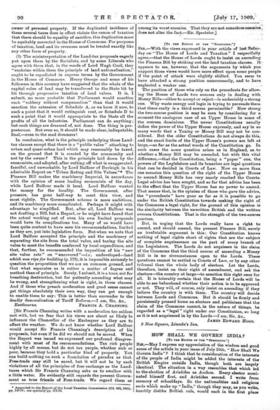[To Tax EDITOR OT TUN " SPECTATOR:1 SIR, --Witb the views
expressed in your article of lad Satur- day on "The House of Lords and Taxation" I respectfully agree,—that the House of Lords ought to insist on amending the Finance Bill by striking out the land taxation clauses. It:
appears to me, however, that the arguments by which you support those views would have more effect upon some people if the point of attack were slightly shifted. You seem to have attacked a strong position unnecessarily, and to have neglected a weaker one.
The position of those who rely on the precedents for allow-
ing the House of Lords two courses only in dealing with. Money Bills—either to accept or reject—is undeniably a strong one. Why waste energy and logic in trying to persuade them that there really is a third course permissible ? How strong the two-course position is may be seen by considering for a moment the analogous case of an Upper House in some of the oversea dominions. The newer Constitutions usually define the power of the Upper House expressly, and say in so many words that a Taxing or Money Bill may not be con- sidered. But the older Constitutions do not always do this, and the exact limits of the Upper House's powers are left at large,—so far as the actual words of the Constitution go. In such cases the same question arises as in England, as.to whether a Money Bill may be amended, but with this vital difference,—that the Constitution, being a "paper" one, the powers of the Legislature and its branches are legal questions that can be decided in Courts of Law. Now on more than one occasion this question of the right of the Upper House to 'amend Money Bills has very nearly reached the Courts.' Legal advice has been sought, and so far that advice has been to the effect that the Upper House has no power to amend. That means that, in the opinion of those who gave the advice, the " precedents " have gone as far as it is possible to go under the British Constitution towards making the right of the COM11101111 a legal right, for the ground of this opinion is the similarity between the unwritten British and the written oversea Constitutions. That is the strength of the two-course position.
But, in urging that the Lords really have a right to amend, and should amend, the present Finance Bill, surely an irrefutable argument is this: Our Constitution knows nothing of legal rights short of rights that are the subject of complete acquiescence on the part of every branch of the Legislature. The Lords do not acquiesce' in the claim of the Commons that the third course of amending a Money Bill is in no circumstances open to the Lords. These questions cannot be settled in Courts of Law, or by any other tribunal than the whole body of electors. Let the Lords, therefore, insist on their right of amendment, and ask the electors—the country at large—to sanction this right once for all. it is tolerably certain that the House of Lords will be able to see beforehand whether their action is to be approved or not. They will, of cotirse, only insist on amending if they believe the country is with them. The country will decide between Lords and Commons. But it should be firmly and persistently pressed home on electors and politicians that the claim of the Commons cannot, in the nature of things, be regarded as a "legal" right under our Constitution, so long as it is not acquiesced in by the Lords.—I am, Sir, &c., JAMES EDWARD HOG.
8 New Square, Lincoln's Inn.








































 Previous page
Previous page